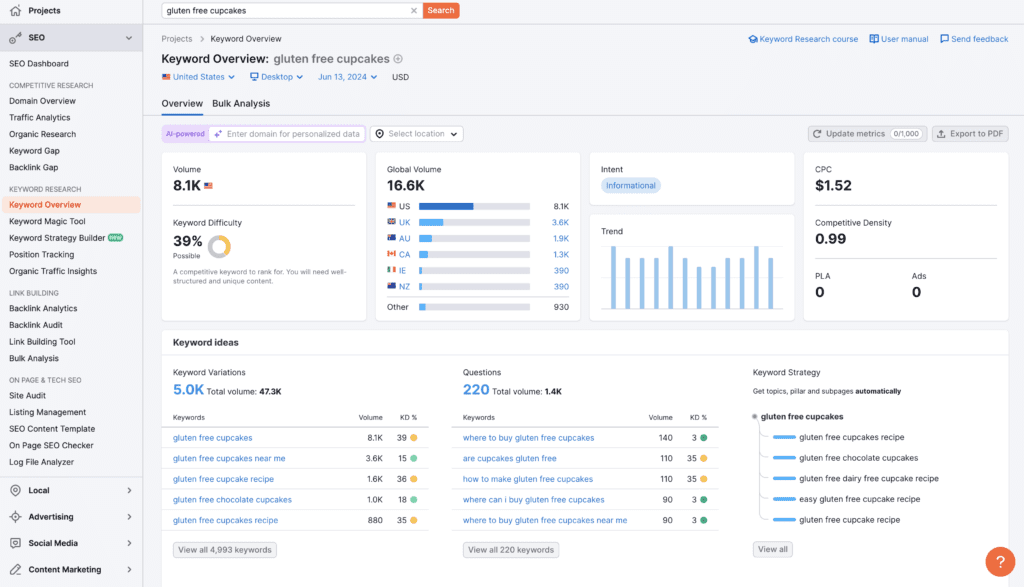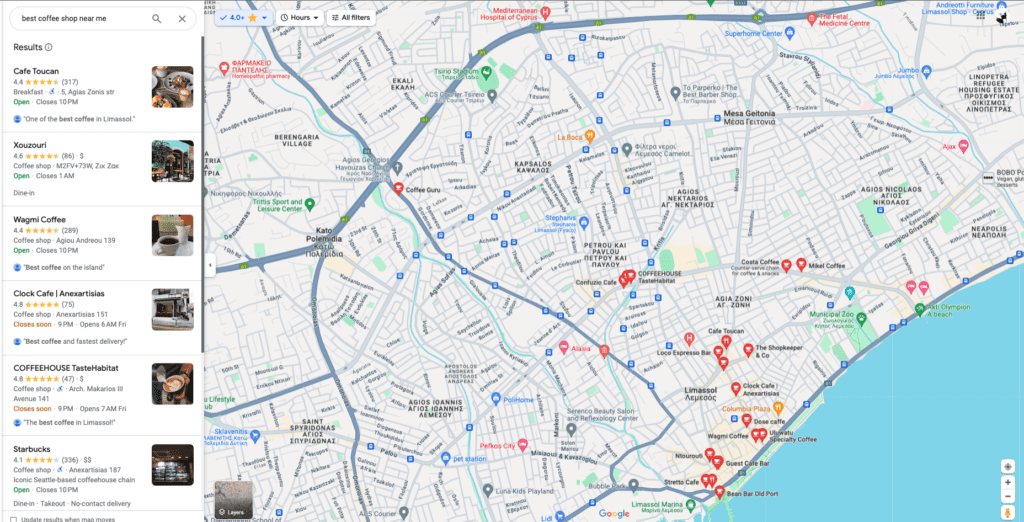SEO is essential for every small business aiming to grow online in 2024. Imagine a small coffee shop in a bustling city. With the right SEO practices, it can rank high in local searches, attracting more foot traffic and online orders.
In this article, we’ll dive into five essential SEO practices tailored for small businesses. From conducting thorough keyword research to optimizing for local SEO, these strategies will help your business stand out. Let’s explore how high-quality content, strategic backlinks, and a mobile-friendly site can transform your online presence, driving growth and customer engagement.
Conduct Thorough Keyword Research
Conducting thorough keyword research is crucial for small businesses looking to enhance their SEO. Imagine running a local bakery; you need to know what potential customers are searching for online. Are they looking for “gluten-free cupcakes” or “artisan bread in [Your Country/ City]”? By identifying these keywords, you can tailor your content to meet their needs, boosting your visibility.
Use tools like Google Keyword Planner, Ubersuggest, and SEMrush to uncover relevant keywords. These tools help you understand search volume, competition, and user intent. For example, if “organic bakery near me” has high search volume but low competition, it’s a golden opportunity.

According to “Content Whale” Long-tail keywords are particularly valuable. They may have lower search volumes but attract more qualified leads. Instead of targeting “bakery,” focus on “organic gluten-free bakery in [Your Country].”
By analyzing your competitors, you can identify keyword gaps and opportunities. See what keywords they rank for and tailor your strategy to outperform them.
Thorough keyword research is the foundation of effective SEO, ensuring your small business appears in the right searches, attracts the right audience, and ultimately grows your customer base.
Optimize for Local SEO
Optimizing for local SEO is essential for small businesses wanting to attract nearby customers. Imagine you own a cozy cafe in downtown; you want locals searching for “best coffee shop near me” to find you. Start by setting up a Google Business Profile. This free tool helps you appear in local searches and Google Maps, making it easier for customers to find you.

Include local keywords in your content, like “best coffee in [Your country/city].” This helps search engines understand your business’s location and relevance. Encourage happy customers to leave reviews on your Google Business Profile. Positive reviews boost your credibility and can improve your local search ranking.
Make sure your business’s name, address, and phone number (NAP) are consistent across all online platforms. This consistency helps search engines verify your business’s location, enhancing your local SEO.
By optimizing for local SEO, you make your business more visible to nearby customers actively searching for what you offer. This not only increases foot traffic but also drives online engagement and orders, helping your small business thrive in its local community.
Focus on High-Quality Content
Focusing on high-quality content is key to improving your small business’s SEO. Imagine you’re a local florist wanting to attract more online orders. By creating high-quality content, like a blog post about “Top 10 Wedding Flowers for 2024,” you can engage your audience and improve your search rankings.
High-quality content means more than just good grammar. It needs to be relevant, valuable, and original. Start by conducting thorough keyword research to understand what your audience is looking for. Use tools like SEMrush or Google Keyword Planner to find popular search terms related to your business.
Once you have your keywords, create content that answers your audience’s questions and solves their problems. For example, write a detailed guide on “How to Choose the Perfect Flowers for Any Occasion.” Make sure your content is engaging and informative, using storytelling to keep readers hooked.
Don’t forget to use multimedia elements like images, videos, and infographics. If you’re explaining how to arrange flowers, include a step-by-step video. This not only makes your content more engaging but also improves your chances of ranking higher in search results.
Update your content regularly to keep it fresh and relevant. For instance, refresh your “Top 10 Wedding Flowers” list annually to include the latest trends.
By focusing on high-quality content, you can attract more visitors, keep them engaged, and improve your SEO, helping your small business grow and thrive online.
Build High-Quality Backlinks
Building high-quality backlinks is crucial for boosting your small business’s SEO. Think of backlinks as votes of confidence from other websites. When reputable sites link to your content, it signals to search engines that your site is trustworthy and valuable.

For example, if you own a local gym, collaborating with fitness bloggers for guest posts can earn you quality backlinks. Write an engaging article on “The Best Home Workouts for Busy Professionals” and share it on a popular fitness blog. This not only brings in traffic from the blog’s audience but also boosts your SEO.
Focus on creating high-quality, shareable content that other websites want to link to. This could be in-depth guides, original research, or engaging infographics. Use tools like HARO (Help A Reporter Out) to connect with journalists looking for expert quotes, which can also earn you valuable backlinks.
Remember, quality over quantity. A few backlinks from high-authority sites are far more effective than many from low-quality sources. Regularly monitor your backlinks to ensure they remain relevant and beneficial to your SEO strategy. Building high-quality backlinks takes time, but it’s a powerful way to enhance your online presence and drive growth.
Enhance Mobile and User Experience
Enhancing mobile and user experience is vital for small businesses to thrive online. Picture this: a potential customer visits your website on their phone, but it’s slow and hard to navigate. Chances are, they’ll leave quickly. To prevent this, ensure your website is mobile-friendly and loads quickly.
Start with mobile-first indexing. Google primarily uses the mobile version of your site for ranking, so it’s crucial that your site is responsive. Test your site on various devices to make sure it’s user-friendly.
Site speed is another key factor. A slow website can frustrate users and harm your SEO. Compress images, leverage browser caching, and minimize code to boost loading times.
User experience (UX) is also essential. An intuitive layout with easy navigation keeps visitors engaged. Imagine a local boutique’s site: clear categories, a smooth checkout process, and fast load times make shopping a breeze.
By enhancing mobile and user experience, you not only improve your SEO but also keep customers happy and engaged, driving more conversions for your small business.
Conclusion
In conclusion, implementing these five essential SEO practices can significantly boost your small business’s online presence. From conducting thorough keyword research to enhancing mobile and user experience, each strategy plays a crucial role. Picture your local bakery attracting more customers through well-optimized content and high-quality backlinks. By focusing on local SEO and creating high-quality content, you ensure your business stands out in search results. Start applying these techniques today and watch your small business grow, reaching new heights in the digital landscape of 2024.
FAQs on The Essential SEO Practices for Small Business:
What is the most important SEO practice for small businesses?
The most important SEO practice for small businesses is conducting thorough keyword research. By understanding what your audience is searching for, you can tailor your content to meet their needs, boosting your search engine visibility and attracting more customers.
How can I optimize my website for local searches?
To optimize your website for local searches, set up and maintain a Google Business Profile. Incorporate local keywords into your content and encourage satisfied customers to leave positive reviews. Consistent name, address, and phone number (NAP) details across all platforms enhance your local SEO.
What are long-tail keywords and why are they important?
Long-tail keywords are specific phrases containing three or more words. They are crucial because they target a niche audience and often lead to higher conversion rates. For example, “organic bakery in [Your City]” is more effective than just “bakery.”
How often should I update my website content for SEO?
Regularly updating your website content keeps it fresh and relevant. This practice not only improves SEO rankings but also ensures that your audience receives up-to-date and valuable information.
What tools can help with keyword research for SEO?
Tools like Google Keyword Planner, Ubersuggest, and SEMrush are essential for keyword research. They help identify relevant keywords, understand user intent, and analyze competitors, forming the backbone of an effective SEO strategy.

